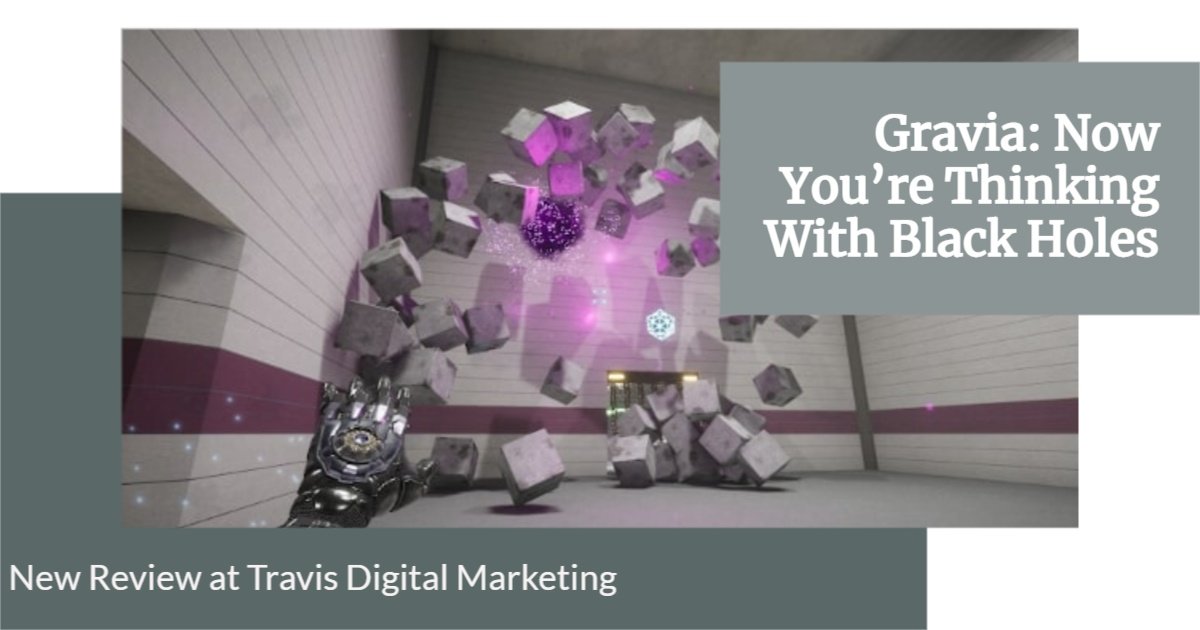I don’t see a lot of physics-based puzzle platformers anymore. What’s with that?
One of the reasons I play games is to feel empowered, and being able to control and manipulate an aspect of reality is absolutely an empowering experience. Games like Portal and Braid inspired generations of indie games, and other lesser-known titles like World of Goo and The Misadventures of P.B. Winterbottom were standouts in my childhood.

So when I came across Gravia, a first-person action puzzle game with a demo available on Steam, it stood out to me amidst the sea of pixelart metroidvanias and roguelike games I usually see on Instagram and Twitter.
Curious, I reached out to the developer to ask him more about it, and he agreed to give me a key for the alpha in return for offering my feedback.
Gravia puts you in control of the Gravia Glove – a device that can open up black holes in the fabric of reality. Most of the objects around the black hole deform and become smashed into sub-atomic particles as they collapse in on their own mass – including you.
The levels alternate between using the black holes – or “rifts” – to solve various puzzles and enhance your speed and movement by leveraging gravity.
This is a game that takes a new spin on a genre that has already been proven to work: in the same way that Portal plays with space, Braid plays with time and Way of Rhea plays with color, Gravia plays with gravity.
So Gravia already has points out of the starting gate. But does it hold up?
Now You’re Thinking With Black Holes
The lead developer cites Braid as a reference, but as I kept playing the comparison I kept making was to Portal.
It looks like Portal. It feels like Portal. It plays like Portal. It’s structured like Portal.
Each new room and level introduces a new way the rifts can be used and manipulated. And I have to admit, the puzzles were pretty fun and well-thought-out. Many of them are very clever and required some out-of-the-box thinking to successfully solve them.
The game also contains many secret rooms that you can discover by clever use of the Gravia glove. When I happened across one it made me feel really smart.
Gravia also comes up with some pretty clever and creative ways you can manipulate the rifts as well. I have to say, watching a tower of man-sized boulders bounce across the floor like bounding gazelles in the African Savannah before bending under the weight of their own mass and collapsing into nothing is both entertaining and a cool spectacle to watch.
Compared to Portal where progression from one level to the next is pretty seamless, Gravia is pretty difficult by comparison. I would often spend an hour or two stuck on one puzzle trying to open rifts on every surface, direction, and way I could think of before giving up and asking the developer for help. Fortunately, there’s a hint system to help you if you get stuck. The developer intends to take this out in the final release, but I hope he doesn’t.
This is a game that gave me a migraine on more than one occasion. I generally don’t like games that made me think too hard and gravitate towards games that make me feel something, so the fact that I stuck with Gravia is a sign to me that it’s onto something.
That’s the good stuff. I do have some gripes.
Gravia Gripes
Gravia is a game that’s currently in alpha stages. The building blocks of the game are there, but the developer intends to put in another year of work to buff out the kinks and give it a polish.
So I want to be fair to Gravia knowing that it’s a work in progress. The foundations for a really enjoyable and rewarding physics puzzler are definitely there. At the same time, Gravia is a game that feels like it’s just skirts on being great but has something missing.
I’ll go back to the Portal comparison. Both Gravia and Portal are games centered around a central, physics-based gameplay mechanic used in every possible way.
But Portal also had a dark and cheerfully nhilistic sense of humor on top of the portals to give it a stronger identity. Gravia is missing that. For Gravia to feel complete, it needs more personality that’s unique to it.
The lead dev has stated his intention to add in more story before the full release. Gravia seems to be darker in tone and feel that Portal – I pick this up in references to unethical experiments gone wrong, and monolithic corporations devaluing human life. Playing that aspect up more would be to Gravia’s benefit.
What else…well there’s the rifts themselves. You know how the layouts in Portal always felt tightly-knit and controlled? That’s hard to pull off when instead of a self-contained portal, you’re toying with a planet-destroying force of nature like a black hole.
Turns out, trying to use the gravitational force of a black hole to leap yourself across a gap is actually pretty tricky. It was often hard to judge speed and distance from the rifts I opened. It’s hard to tell by sight alone whether I’m too close to a Rift to pull away from it in time before being killed, which is a problem because games like this require precision.
On a final note, Gravia has fall damage. I don’t think a physics platformer should have that.
Is Gravia Worth Its Weight?
Gravia has a lot going for it and I had a lot of fun playing it, and I think the potential for a game that’s both fun to play and commercially successful is there.
For that to happen Gravia needs more of a narrative and a stronger identity of its own. That said, Gravia has a strong core gameplay mechanic that’s a lot of fun to experiment with.
If anything in this review has made you even remotely curious, then go ahead and play the demo and buy it on Early Access if you like it.
Both Portal and Gravia have fun and challenging gameplay. Portal also has humor. Gravia needs something else.You can support Gravia by downloading the Gravia Demo, and following them on Twitter, Discord and Instagram.

